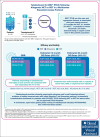Tabelecleucel for EBV+ PTLD after allogeneic HCT or SOT in a multicenter expanded access protocol
- PMID: 38625984
- PMCID: PMC11215195
- DOI: 10.1182/bloodadvances.2023011626
Tabelecleucel for EBV+ PTLD after allogeneic HCT or SOT in a multicenter expanded access protocol
Abstract
Patients with Epstein-Barr virus (EBV)-positive posttransplant lymphoproliferative disease (EBV+ PTLD) in whom initial treatment fails have few options and historically low median overall survival (OS) of 0.7 months after allogeneic hematopoietic cell transplant (HCT) and 4.1 months after solid organ transplant (SOT). Tabelecleucel is an off-the-shelf, allogeneic EBV-specific cytotoxic T-lymphocyte immunotherapy for EBV+ PTLD. Previous single-center experience showed responses in patients with EBV+ PTLD after HCT or SOT. We now report outcomes from a multicenter expanded access protocol in HCT (n = 14) and SOT (n = 12) recipients treated with tabelecleucel for EBV+ PTLD that was relapsed/refractory (R/R) to rituximab with/without chemotherapy. The investigator-assessed objective response rate was 65.4% overall (including 38.5% with a complete and 26.9% with a partial response), 50.0% in HCT, and 83.3% in SOT. The estimated 1- and 2-year OS rates were both 70.0% (95% confidence interval [CI], 46.5-84.7) overall, both 61.5% (95% CI, 30.8-81.8) in HCT, and both 81.5% (95% CI, 43.5-95.1) in SOT (median follow-up: 8.2, 2.8, and 22.5 months, respectively). Patients responding to tabelecleucel had higher 1- and 2-year OS rates (94.1%) than nonresponders (0%). Treatment was well tolerated, with no reports of tumor flare, cytokine release syndrome, or rejection of marrow and SOT. Results demonstrate clinically meaningful outcomes across a broad population treated with tabelecleucel, indicating a potentially transformative and accessible treatment advance for R/R EBV+ PTLD after HCT or SOT. This trial was registered at www.ClinicalTrials.gov as #NCT02822495.
© 2024 by The American Society of Hematology. Licensed under Creative Commons Attribution-NonCommercial-NoDerivatives 4.0 International (CC BY-NC-ND 4.0), permitting only noncommercial, nonderivative use with attribution. All other rights reserved.
Conflict of interest statement
Conflict-of-interest disclosure: S.N. receives consultancy fees from GlaxoSmithKline, Iovance, and Kite/Gilead. J.S.W. receives consultancy fees from Mallinkrodt and Orchard Therapeutics, and is employed by VOR Biopharma. R.R. serves in a consultant or advisory role with Atara Biotherapeutics, Gilead Sciences, Takeda, Instil Bio, Regeneron, TScan, Synthekine, Orca, MidaTech, Capstan, and Jasper; serves in an expert witness role with Bayer; and receives research funding from Atara Biotherapeutics, Sanofi, Immatics, Takeda, Gilead Sciences, CareDx, TScan, Synthekine, Bristol Myers Squibb, Johnson & Johnson, and Precision Biosciences. D.E.T. reports receiving employment income and stock options from Loxo Oncology. K.M.M. receives support for the conduct of sponsored clinical trials from Atara Biotherapeutics. K.V.B. receives research funding from Miltenyi, Precision Biosciences, ORCA Biotherapeutics, Calibr, and Bristol Myers Squibb; is a shareholder and advisory board member for Hemogenyx; receives honorarium from Pfizer; and receives consultancy fees from Glycostem, Autolus, ADC Therapeutics, Gamida Biosciences, Intellia, and CTI. S.D.N. receives research funding from Genentech/Roche, Millenium/Takeda, Rafael, Debiopharm, and Pharmacyclics. S.P. is a coinventor of intellectual property licensed to Atara Biotherapeutics with all rights to this intellectual property assigned to Memorial Sloan Kettering Cancer Center (MSK) and has no personal financial interests in Atara Biotherapeutics, and received research funding in support of sponsored clinical trials from Atara Biotherapeutics, Jasper Therapeutics, and AlloVir through MSK. MSK has financial interests in Atara Biotherapeutics and intellectual property interests relevant to the work that is related to this study. A.M., J.W., L.G., and R.D. are employees and shareholders of Atara Biotherapeutics. W.Z., Y.S., and F.G. were employees of Atara Biotherapeutics at the time of the studies; the studies were funded by Atara Biotherapeutics starting in 2015. The remaining authors declare no competing financial interests.
Figures



References
-
- Meij P, van Esser JW, Niesters HG, et al. Impaired recovery of Epstein-Barr virus (EBV)--specific CD8+ T lymphocytes after partially T-depleted allogeneic stem cell transplantation may identify patients at very high risk for progressive EBV reactivation and lymphoproliferative disease. Blood. 2003;101(11):4290–4297. - PubMed
-
- Al Hamed R, Bazarbachi AH, Mohty M. Epstein-Barr virus-related post-transplant lymphoproliferative disease (EBV-PTLD) in the setting of allogeneic stem cell transplantation: a comprehensive review from pathogenesis to forthcoming treatment modalities. Bone Marrow Transplant. 2020;55(1):25–39. - PubMed
Publication types
MeSH terms
Associated data
Grants and funding
LinkOut - more resources
Full Text Sources
Medical

